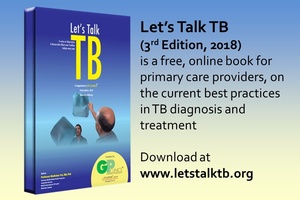A free TB resource for primary care providers
The 3rd Edition of Let's Talk TB, a free, online book, aims to provide primary care providers with the most relevant information on how to diagnose and manage TB.
In 2016, over 10 million people developed TB, and 1.7 million died of TB. Globally, 40% of these patients with TB did not get diagnosed or notified. In large part, this is because primary care providers, usually the first point of contact for most patients with TB, have little or no training in TB care, and are rarely engaged by TB care programs.
In many countries, patients begin seeking care from informal and private sector providers, and endure long, tortuous pathways to care. For example, in India, more than 50% of India’s TB patients seek care in the private sector, and private providers and GPs (i.e. family docs) are often the first point of care even for patients treated in the public sector. Most GPs in India are in the private sector and have not been engaged at scale by the TB control program.
Unfortunately, primary care practitioners, especially those in the private/informal sector, rarely adhere to national and international standards, and there is plenty of evidence that quality of TB care is often suboptimal. Cascade of care analyses and simulated patient studies show big gaps in quality of care. Only half of all patients with drug-sensitive TB get adequately diagnosed and treated, while less than one in five MDR-TB patients complete the cascade of care. Data also show that one in five children with TB fail to complete the cascade of care in some settings. Such broken care cascades result in emergence of drug-resistance, and also explains the high TB mortality rate in many settings.
Simulated patient (i.e. mystery client) studies in 3 countries show that most primary care providers are unable to diagnose TB and referral linkages to the national TB program (NTP) system are weak. In India, China and Kenya, only 28% to 45% of mystery patients were correctly managed by primary care providers. Even when a typical, textbook case of suspected TB was presented, most primary care providers were unable to diagnose TB or refer patients for adequate testing.
Thus, to reach the missing millions with TB, we must engage, educate and incentivize GPs and private practitioners. Education is an early, key step in engagement. With this in mind, in 2014, the first edition of Let's Talk TB was published online by GP Clinics, a publisher focused on education of GPs and primary care providers. This modest booklet contained 5 chapters on how to diagnose and treat TB.
With the addition of new material, a second edition was released in 2016, with 13 chapters. The third edition, released in 2018, has grown to include a total of 18 chapters, contributed by 20 experts and authors from many countries. The goal remains the same: to educate primary care providers on the best practices in TB diagnosis, treatment and follow-up. All articles are richly illustrated, and most include quizzes and CME questions for self learning. The 3rd edition includes new chapters on MDR-TB, adverse effects of TB drugs, adherence monitoring strategies, and nutritional support. There is also content on how to manage children with TB, care for patients co-infected with TB and HIV, how to read and interpret chest x-rays, and how to avoid common pitfalls in TB management.
By making the book free access, the authors and the publisher hope to make a positive contribution to improving quality of TB care at the primary care level, and hope the book will be widely read and shared.
Acknowledgements: I am grateful to my co-authors who contributed their valuable expertise and time to this project. I am indebted to Marzieh Ghiasi, a MD-PhD student, for her wonderful work as the website developer. I am particularly grateful to Dr Anupam Aggarwal, Editor and Publisher of GP Clinics. His enthusiasm and support for TB control is exceptional, and his desire to educate GPs about evidence-based clinical practices makes him special. Lastly, several NGOs and partners in India have purchased hard copies of the book, and distributed to GPs and private doctors. I am grateful to them for their efforts.
Source: Nature Microbiology


